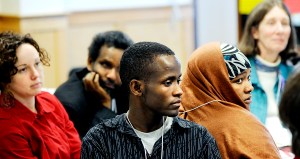LEWISTON — How the Lewiston-Auburn community reacted to snuff out prejudice against local Somalis in 2006 makes it a leader in the nation, said Steve Wessler, executive director of the Center for Preventing Hate.
There’s still more work to do, but Lewiston handled it so well that lessons learned here will be shared with cities throughout the country, Wessler said.
He spoke Friday at a daylong conference titled Advice for America: What Lewiston-Auburn has Learned Since 2000 about Fostering Relationships Between Residents and Newcomers. The event was held at the University of Southern Maine’s Lewiston-Auburn College.
“We’re here to share and celebrate, share the experiences of what has worked, what has helped change the community,” Wessler said. “Where there was a lot of diversity is now a model for cities elsewhere.”
His group will spend the next three years on The New Migration Project, working in cities in strife after immigrants have moved in. Those communities include Boise, Idaho; Fort Wayne, Ind.; Frederick, Md.; and Manchester, N.H. That will be followed up with a national conference in Lewiston later this year.
The Center for Preventing Hate in Portland, formerly called the Center for the Prevention of Hate Violence, will replicate what has worked in Lewiston, Wessler said.
He offered a national perspective on what happens when people of different races, religions and cultures move into a community. Over the past 10 years the country has experienced increasing levels of bias and anger toward immigrants, he said.
“There are lots of reasons for that,” he said. “It’s certainly being fueled by people in positions of responsibility, radio and talk TV shows who feel comfortable articulating the worst type of anger and prejudice at new Americans.”
Shortly after a man rolled a pig’s head into a Somali mosque in downtown Lewiston in 2006 — an event that attracted national and international press — “we did interviews with dozens of people, Somali- and American-born, to get a sense of the community,” Wessler said. “What we found was sobering.”
Almost every Somali girl and woman offered examples of hate and violence directed at them as they walked on streets or shopped in grocery stores.
“That’s not a Lewiston-Auburn phenomenon; that’s a national phenomenon,” Wessler said.
Communities with immigrant populations must reflect and decide they can do better, he said, adding that Lewiston-Auburn did that.
“What is notable is how far this community has come, what the commitment is, the innovative programs developed in schools, hospitals, community organizations, local government, police,” he said. “It’s a huge change.”
Numerous groups held meetings, inviting established residents to get to know the newcomers. Changes are made one person at a time, Wessler said. He offered an example:
Shortly after the pig’s head incident, his organization met with Somali teens to get a sense of what they thought about the community. A teen named Mustaf told the group that he was driving his parents’ car the day before and was stopped in traffic. When he made eye contact with a white American, the man started running toward him, dashing across two lanes to get to him. The boy’s windows were down. He was frightened, not knowing what would happen next.
“The man leans in the window and says, ‘I am so sorry about what happened to your mosque. I am so glad your family and other families are here in Lewiston-Auburn.’ The man turned and went away.”
The incident changed how Mustaf felt about the community. When he shared the story with the 10 other teens in the room, “the impact was profound,” Wessler said. “When we reach out over what we think are barriers, the personal impact is huge. That incident that happened to Mustaf is replicated every single day in this community. That is what we need to celebrate. That is what we need to spread around the country.”
Today Mustaf is a premed student at the University of New England, Wessler said. “He plans on coming back to this community as a physician to serve.”
After Wessler’s talk, college student Huda Daud, 21, of Lewiston said more improvement is needed, but many good things have happened.
Daud moved to Lewiston when she was 12. “I remember in 2001-2002 we were afraid to walk down the street, even though we were little kids.” They were called names and heard comments such as, ‘Go back to Africa.'”
That doesn’t happen anymore, she said. “Now I can go anywhere I want.”
Gillian Bourassa, left,
Abdullahi Abdi, Rilwan Osman, Khadija Noorow and Jeri Maurer participate in a
daylong conference on fostering relationships between residents and newcomers at the
University of Southern Maine’s Lewiston-Auburn College on Friday.

Comments are no longer available on this story